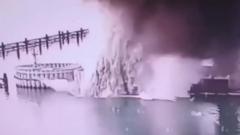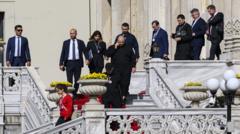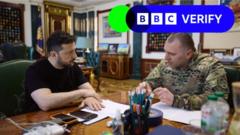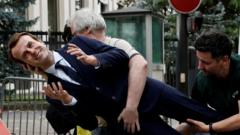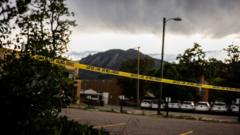General Carsten Breuer emphasizes urgency of preparedness ahead of key NATO summit and highlights diverse perceptions of threat among European nations.
**German Defense Chief Issues Stark Warning about Potential Russian Threat to NATO**
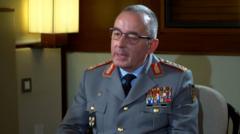
**German Defense Chief Issues Stark Warning about Potential Russian Threat to NATO**
Experts caution NATO members to enhance military readiness as Russia intensifies military production.
Germany's chief of defense, General Carsten Breuer, delivered a chilling warning at the Shangri-la Dialogue in Singapore, urging NATO members to prepare for a possible Russian attack within the next four years. Breuer indicated that Russia is ramping up military production, including the annual creation of hundreds of main battle tanks, potential targets for NATO's Baltic member states as early as 2029.
Maintaining unity amid differing views, Breuer affirmed NATO's solidarity regarding the war in Ukraine, despite recent contrasting opinions from Hungary and Slovakia. His address serves as a precursor to the upcoming NATO summit in The Hague, which will cover crucial topics like defense budgets.
The general described Russia as posing an unprecedented "very serious threat" in his four decades of military service. He provided alarming statistics, estimating that Russia produces around 1,500 main battle tanks annually, many of which are not deployed in Ukraine but reserved for availing military strength directed at the West.
Breuer's analysis, backed by German and allied analysts, includes predictions that Russia's stockpiles could be ready for offensive actions against the Baltic states by 2029. He warned that NATO must be prepared for potential military action imminently, underscoring the vulnerability of the so-called Suwalki Gap, an area critical to Baltic security.
The general illustrated the differing degrees of urgency felt by NATO members, citing an analogy from Estonian officials comparing the situation to being near a wildfire—where the danger feels more immediate compared to nations further from the frontlines. He attributed this urgency to Russia's view of the Ukraine conflict as part of a broader confrontation with NATO.
In recent months, attacks on undersea cables, cyber threats on European infrastructure, and the presence of unidentified drones over German facilities have underscored this sentiment, urging NATO members to bolster their military capabilities. Breuer called for reinvigorated defense efforts to establish deterrence.
Despite criticisms regarding NATO cohesiveness given Hungary and Slovakia's leanings toward Moscow, Breuer asserted there exists robust unity among member nations. He cited the rapid accession of Finland and Sweden to NATO as a sign of collective resolve, stating, "I've never seen such unity like it is now."
This stark warning complements a broader shift in Germany's defense posture, as public and political awareness of the need for military investment has increased. The German Green Party, traditionally cautious regarding defense spending, has joined calls to lift spending restrictions to bolster military capabilities.
While military leaders assert readiness for defense, challenges remain regarding the time required for the European military-industrial base to scale up production. Compounding this complexity is the reality of the United States shifting focus toward the Indo-Pacific region, thereby reducing its defense commitments in Europe. The urgency for NATO's preparedness has never been clearer as uncertainty around Russia's next moves looms.
Maintaining unity amid differing views, Breuer affirmed NATO's solidarity regarding the war in Ukraine, despite recent contrasting opinions from Hungary and Slovakia. His address serves as a precursor to the upcoming NATO summit in The Hague, which will cover crucial topics like defense budgets.
The general described Russia as posing an unprecedented "very serious threat" in his four decades of military service. He provided alarming statistics, estimating that Russia produces around 1,500 main battle tanks annually, many of which are not deployed in Ukraine but reserved for availing military strength directed at the West.
Breuer's analysis, backed by German and allied analysts, includes predictions that Russia's stockpiles could be ready for offensive actions against the Baltic states by 2029. He warned that NATO must be prepared for potential military action imminently, underscoring the vulnerability of the so-called Suwalki Gap, an area critical to Baltic security.
The general illustrated the differing degrees of urgency felt by NATO members, citing an analogy from Estonian officials comparing the situation to being near a wildfire—where the danger feels more immediate compared to nations further from the frontlines. He attributed this urgency to Russia's view of the Ukraine conflict as part of a broader confrontation with NATO.
In recent months, attacks on undersea cables, cyber threats on European infrastructure, and the presence of unidentified drones over German facilities have underscored this sentiment, urging NATO members to bolster their military capabilities. Breuer called for reinvigorated defense efforts to establish deterrence.
Despite criticisms regarding NATO cohesiveness given Hungary and Slovakia's leanings toward Moscow, Breuer asserted there exists robust unity among member nations. He cited the rapid accession of Finland and Sweden to NATO as a sign of collective resolve, stating, "I've never seen such unity like it is now."
This stark warning complements a broader shift in Germany's defense posture, as public and political awareness of the need for military investment has increased. The German Green Party, traditionally cautious regarding defense spending, has joined calls to lift spending restrictions to bolster military capabilities.
While military leaders assert readiness for defense, challenges remain regarding the time required for the European military-industrial base to scale up production. Compounding this complexity is the reality of the United States shifting focus toward the Indo-Pacific region, thereby reducing its defense commitments in Europe. The urgency for NATO's preparedness has never been clearer as uncertainty around Russia's next moves looms.









